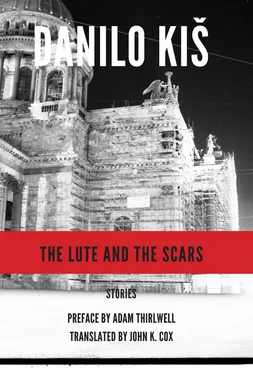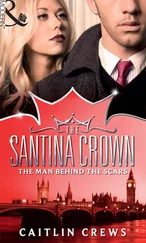Budišić: How come you wrote it? Who told you to do it? Who were you in cahoots with?
Mr. Ličina: I sincerely regret it.
Budišić: Too late, too late. You should have thought of that earlier.
So they led him away into investigative detention. These were the days when the new regime had not yet consolidated its power, and the Chetniks, “bushfighters,” and other renegades were still hiding out in remote districts. Sometimes they would come down into the cities and — in the coffee houses, under napkins — leave behind messages such as: “Mile Kožurica ate here, Chetnik rebel. Long live King Petar!”
Budišić, accordingly, had more serious matters to deal with than the case of Mr. Ličina. One day he was summoned to Kosovo, where the “bushfighters” were wandering around wreaking havoc, so Mr. Ličina remained in detention for two or three months. He was a model prisoner. He mingled little with the other inmates, and he barely ever spoke. Sometimes he recited, half to himself, this or that verse. Dučić and Rakić for the most part. (“Thus they say to us, children of this century. ” and so on. Or: “Tonight, my lady, at the prince’s ball. ”)
In January the interrogations began. He was now being questioned by a certain Projević.
“So, Ličina. You wrote a poem against Tito and the National Liberation Struggle. Do you know what we were doing with the likes of you less than six months ago? You know exactly what. You know. Remember that I’m not Budišić. Remember that. There’ll be no dilly-dallying with me. Go on, spill it. Who put you up to this? Who helped you write it? At whose behest? Who paid you? Answer each in turn.”
Mr. Ličina: I have already answered everything forthrightly and freely.
Projević: Leave your feelings of sincerity out of this, you miscreant. What do your feelings have to do with it?
Mr. Ličina: Believe me, sir, I don’t remember anything else.
Projević: Should I help your mem’ry along a bit?
Mr. Ličina: I admit that the verses were inappropriate. Morally I bear full responsibility.
Projević: And you say you don’t recall a single line?
Mr. Ličina: No. I give you my word of honor. I wrote the verses at four in the morning. Composed them at the typewriter.
Projević: Go on. Keep talking. We have a lot more important things to do than this.
Mr. Ličina: Then I put on my coat and picked up my umbrella. Forgive me, but what’s become of my dog?
Projević: Well, look at him go. He’s back on the dog kick again. I told you: we’re feeding him every day, three times a day, with sausages and Dalmatian prosciutto. We’re giving him milk, as if he weren’t a dog but a lamb. Now just go on.
Mr. Ličina: I thank you for that. I’m relieved to hear it.
Projević: You took your coat and umbrella and went out into the street. Did you show the poem to anyone?
Mr. Ličina: Not to anyone.
Projević: Whom did you run into along the way?
Mr. Ličina: I cannot recall. Nobody.
Projević: This is really rich. Just great. Doesn’t remember the poem, doesn’t remember the people. But don’t play naïve with me. You’re no fool if you know how to write poems against the Partisans and against the people. We’ll fix you right up. Oh, yes we will. Don’t you worry about that. Here’s a pencil for you, and paper, and now produce some poetry, my friend. To your heart’s content.
Mr. Ličina: Thank you, sir.
Projević: Don’t thank me, you worthless piece of. You act like this is a gift. Now get lost.
Mr. Ličina: Thank you, sir.
Projević: I don’t want to set eyes on you till this poem is finished.
Mr. Ličina: I understand, sir.
Projević: How much time will you need. Let’s say three months?
Mr. Ličina: Three days would be quite enough.
Projević: Nonsense! Three days? No way. Write it and revise it for three months. Till it looks like it was written by Zogović. Get it? Like Zogović? Or Mayakovsky. Now get a move on!
So Mr. Ličina passed three months in solitary confinement, working on his schoolboy composition. He wrote and rewrote exactly as Projević had told him to do. First he composed a sonnet with an abba rhyme scheme. Then he changed it (keeping the words) into abab , while leaving the tercets the same. Ultimately he modified the tercets and discarded both of the final rhymes (“Front” / “Piemont”), because they sounded old-fashioned to him. And then. his paper ran out. That meant he had tried all the variants. There was nothing for him to do but wait. After exactly seventy-four days, he was led before Projević.
“Let’s see it, poet,” said Projević.
Mr. Ličina handed the paper to him across the table.
Projević: Sit down, sit down. Why are you looking at me like a deer in headlights?. Here, in the nice chair, you bastard. Riiiiiight . Let’s have a look-see.
Mr. Ličina sat on the very edge of the armchair, holding his beret in his hand. (It was the only piece of civilian clothing he had on.) He smelled the aroma of coffee and closed his eyes, as if he were drowsy. (He was probably thinking of his dog. Who could tell, with senile old grandpas like this one?)
Projević yanked him out of his reverie.
“From the bottom of my heart — this is good. Congratulations!”
Mr. Ličina: I tried hard.
Projević: That’s plenty obvious. Bravo. So you see, you can do it when you want to.
Mr. Ličina: As far as the rhyme goes, the poem is beyond reproach.
Projević: Don’t exaggerate.
Mr. Ličina: I gave my all.
Projević: Your all, you say. All you had?. Well, ol’ Ličina, you don’t know what it means to give your all. Don’t you think, you shit, that a better rhyme might still be out there? Eh? Well, look for it. We have time, Comrade Ličina; we have tons of time. The future lies before us, the future in its entirety! So get rolling and don’t let me see your face again until the poem sounds like something Mayakovsky wrote. Do you understand? Children should recite your poem at school festivals, and soldiers should sing it from the ranks. Here’s some more paper for you. Think that’s enough? Now beat it. Take him away. Good luck, poet.
Projević sipped at his cup of now cold coffee and started going through his stack of papers again.
Then he looked up.
Projević: Are you still here?
Mr. Ličina: I just wanted to ask, sir.
Projević (slapping his palm against his forehead): Aha, I had almost forgotten. Now we’re feeding him with American canned goods from the Ministry’s warehouse. He’s gotten twice as wide as he is long. I give you my word.
Then he plunged back into his files.
In the course of the next three months (the year was ’47), Mr. Ličina went through more paper than a rat. So much so that Projević sent this message via the guard: “The director is asking whether you are eating the paper, like a rat?” Meanwhile, a performance was held in the prison in which some actors from the city recited Mayakovsky and other poets. Mr. Ličina was aglow with the fever of creativity. He didn’t like the Mayakovsky. It was a long way from Dučić-Rakić. Quite a long way. And with no rhythm. Sloppy rhymes. His sonnet was better, much better. Objectively speaking. Without even considering his biography and background. If a Partisan or some younger poet had signed his name to it, this poem would have made him famous. But now.
He placed a whole stack of papers on the desk in front of Projević.
“O Ličina the Pathetic — what’s all this stuff?” Projević asked.
“They are poems, sir.”
“Ah, so they are. Poems. And you, Ličina, you think we’re playing school here. You think I have nothing more important to do than read your poems. Or to select them myself . Get cracking! I don’t want to see you for another three months. Not until (he glanced at the calendar on his desk), not until September. Have we understood each other?”
Читать дальше












